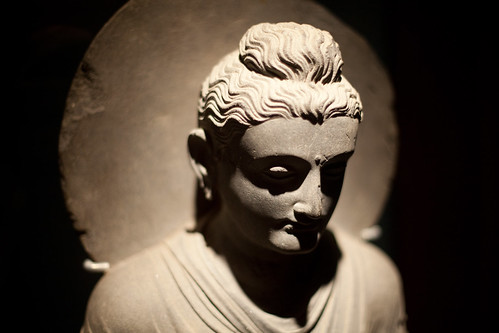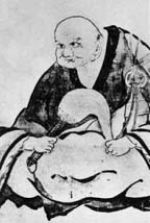Feb 17 2017
Hakuin – Hakuin’s Song of Zazen
Hakuin’s Song of Zazen
by Hakuin
English version by Daisetz Teitaro Suzuki
All beings are primarily Buddhas.
It is like water and ice:
There is no ice apart from water;
There are no Buddhas apart from beings.
Not knowing how close the truth is to them,
Beings seek for it afar — what a pity!
They are like those who, being in the midst of water,
Cry out for water, feeling thirst.
They are like the son of the rich man,
Who, wandering away from his father,
Goes astray amongst the poor.
It is all due to their ignorance
That beings transmigrate in the darkness
Of the Six Paths of existence.
When they wander from darkness to darkness,
How can they ever be free from birth-and-death?
As for the Dhyana practice as taught in the Mahayana,
No amount of praise can exhaust its merits.
The Six Paramitas–beginning with the Giving, Observing the Precepts,
And other good deeds, variously enumerated,
Such as Nembutsu, Repentance, Moral Training, and so on —
All are finally reducible to the practice of Dhyana.
The merit of Dhyana practice, even during a single sitting,
Erases the countless sins accumulated in the past.
Where then are the Evil Paths to misguide us?
The Pure Land cannot be far away.
Those who, for once, listening to the Dharma
In all humility,
Praise it and faithfully follow it,
Will be endowed with innumerable merits.
But how much more so when you turn your eyes within yourselves
And have a glimpse into your self-nature!
You find that the self-nature is no-nature –
The truth permitting no idle sophistry.
For you, then, open the gate leading to the oneness of cause and effect;
Before you, then, lies a straight road of non-duality and non-trinity.
When you understand that form is the form of the formless,
Your coming-and-going takes place nowhere else but where you are.
When you understand that thought is the thought of the thought-less.
Your singing-and-dancing is no other than the voice of the Dharma.
How boundless is the sky of Samadhi!
How refreshingly bright is the moon of the Fourfold Wisdom!
Being so is there anything you lack?
As the Absolute presents itself before you
The place where you stand is the Land of the Lotus,
And your person — the body of the Buddha.
 — from Essays in Zen Buddhism, First Series, by Daisetz Teitaro Suzuki
— from Essays in Zen Buddhism, First Series, by Daisetz Teitaro Suzuki

/ Image by Ed Schipul /
After Wednesday’s epic rambling Zen-Beat “scripture”-poem by Kerouac, I thought it might fit to follow up today with a more traditional, highly revered poem by the great Zen master Hakuin Zenji.
You will see that several of the ideas Kerouac was exploring are expressed here, as well, though in a much more contained and elegant manner. The essence of the two poems might be summed up as everything is already That, or, as Hakuin starts us off–
All beings are primarily Buddhas.
It is simply ignorance about one’s own nature that keeps us blind to our inherent enlightenment.
Not knowing how close the truth is to them,
Beings seek for it afar — what a pity!
It is not that we acquire enlightenment. Anything that can be gained, that has a beginning, necessarily has an end and is, therefore, not lasting. It is not that we are unenlightened and, at some point, become enlightened. The point here is that we — and all beings — are enlightened all along. What is necessary is not to become enlightened, but to stop clinging to the idea that we are not enlightened.
They are like those who, being in the midst of water,
Cry out for water, feeling thirst.
We can see this insight as absurd, even offensive to all of our struggles — or it can be the key that brings us immediately into the awareness of our own enlightened nature, right now.
A few terms that might help to appreciate this poem more fully:
Dhyana – Meditation. Read this not simply as the act of sitting still, but as the inner state of deeply collected awareness.
Dharma – Can be translated as the Way, the Path, the Law, Righteousness. We might think of it as the directional flow of universal consciousness and how we, through our focus and actions, enter into that flow.
Samadhi – The blissful union of the individual awareness with the Eternal, often considered the mark of enlightenment.
The Six Paramitas – These are six qualities or “perfections” that naturally appear along the spiritual path: generosity, morality, patience, joyful action, concentration, and wisdom.
Nembutsu – The practice of chanting the names of the Buddha.
As the Absolute presents itself before you
The place where you stand is the Land of the Lotus,
And your person — the body of the Buddha.

|
Hakuin
Japan (1686 – 1768) Timeline |
The Zen master Hakuin Ekaku, sometimes called Hakuin Zenji, was born Sugiyama Iwajiro in a small Japanese coastal village at the foot of Mt. Fuji.
When he was seven years old, Hakuin heard the reciting of a Buddhist sutra that described the terrors of hell. This so frightened the boy that he resolved to become a monk, in order to avoid such torments.
Though his parents opposed his decision, Hakuin took monastic vows at the age of 15.
He studied the Buddhist scriptures intensely, but was deeply shaken by reading of the painful death of a famous Chinese Chan master. The young Hakuin lost his faith in the Buddhist path for a while, hiding himself in the study of literature.
But, at the age of 22, he had his first experience of satori or enlightenment when he heard a sentence from a Buddhist scripture being recited.
After that, he dedicated himself wholeheartedly to the full realization of Nirvana, unshakable peace.
At this time, Zen Buddhism had become the court religion and, in its preeminence, lost much its inner spiritual vitality. Hakuin is credited with saving the tradition from its decline virtually single-handedly, returning Zen to its rich spiritual essence.
He organized koan training (authoring the famous koan, “What is the sound of one hand clapping?”) and re-emphasized the zazen practice of sitting meditation.
Hakuin’s reforms were highly effective, as seen by the profound impact Zen has in the world of spiritual practice today.
What a wonderful poem. The bare truth that we so much so search for, we already have with us, while remaining ignorant, blind and oblivious to it. How can we fibd something which we already have, which is we ourselves. The notions we adhere to and the illusory mental conceptions we entertain are all false.these blind us to the bare truth.
So long as we continue to fill out emptiness with the distinct notions and conceptions of this and that, we remain barred from the real truth. But if we remain steadfast ib being empty and quit helping ourselves, then the real fills the dark empty void with his light and so brings us to its truth by what is from it, not by the vanities which is from us.
Than it is that we become the very form of the formless and the very embodiment of the truth.
[…] – in essence, you are meant to be the you-est you! I found the link speaking to this more here, should you want to explore this […]